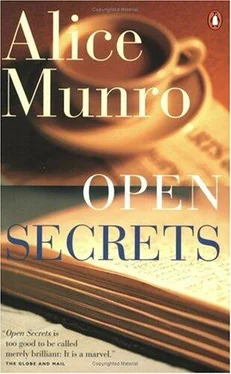“The account of the accident that was printed in the paper — I take it that was more or less accurate?”
Arthur said that it was possibly too accurate.
“Why? Why do you say that?”
He mentioned the public’s endless appetite for horrific details. Ought the paper to pander to that?
“Oh, I think it’s natural,” the Librarian said. “I think it’s natural to want to know the worst. People do want to picture it. I do myself. I am very ignorant of machinery. It’s hard for me to imagine what happened. Even with the paper’s help. Did the machine do something unexpected?”
“No,” Arthur said. “It wasn’t the machine grabbing him and pulling him in, like an animal. He made a wrong move or at any rate a careless move. Then he was done for.”
She said nothing, but did not move away.
“You have to keep your wits about you,” Arthur said. “Never let up for a second. A machine is your servant and it is an excellent servant, but it makes an imbecile master.”
He wondered if he had read that somewhere, or had thought it up himself.
“And I suppose there are no ways of protecting people?” the Librarian said. “But you must know all about that.”
She left him then. Somebody had come in.
The accident was followed by a rush of warm weather. The length of the evenings and the heat of the balmy days seemed sudden and surprising, as if this were not the way winter finally ended in that part of the country, almost every year. The sheets of floodwater shrank magically back into the bogs, and the leaves shot out of the reddened branches, and barnyard smells drifted into town and were wrapped in the smell of lilacs.
Instead of wanting to be outdoors on such evenings, Arthur found himself thinking of the Library, and he would often end up there, sitting in the spot he had chosen on his first visit. He would sit for half an hour, or an hour. He looked at the London Illustrated News , or the National Geographic or Saturday Night or Collier’s . All of these magazines arrived at his own house and he could have been sitting there, in the den, looking out at his hedged lawns, which old Agnew kept in tolerable condition, and the flower beds now full of tulips of every vivid color and combination. It seemed that he preferred the view of the main street, where the occasional brisk-looking new Ford went by, or some stuttering older-model car with a dusty cloth top. He preferred the Post Office, with its clock tower telling four different times in four different directions — and, as people liked to say, all wrong. Also the passing and loitering on the sidewalk. People trying to get the drinking fountain to work, although it wasn’t turned on till the First of July.
It was not that he felt the need of sociability. He was not there for chat, though he would greet people if he knew them by name, and he did know most. And he might exchange a few words with the Librarian, though often it was only “Good evening” when he came in, and “Good night” when he went out. He made no demands on anybody. He felt his presence to be genial, reassuring, and, above all, natural. By sitting here, reading and reflecting, here instead of at home, he seemed to himself to be providing something. People could count on it.
There was an expression he liked. Public servant . His father, who looked out at him here with tinted baby-pink cheeks and glassy blue eyes and an old man’s petulant mouth, had never thought of himself so. He had thought of himself more as a public character and benefactor. He had operated by whims and decrees, and he had got away with it. He would go around the factory when business was slow, and say to one man and another, “Go home. Go on home now. Go home and stay there till I can use you again.” And they would go. They would work in their gardens or go out shooting rabbits and run up bills for whatever they had to buy, and accept that it couldn’t be otherwise. It was still a joke with them, to imitate his bark. Go on home! He was their hero more than Arthur could ever be, but they were not prepared to take the same treatment today. During the war, they had got used to the good wages and to being always in demand. They never thought of the glut of labor the soldiers had created when they came home, never thought about how a business like this was kept going by luck and ingenuity from one year to the next, even from one season to the next. They didn’t like changes — they were not happy about the switch now to player pianos, which Arthur believed were the hope of the future. But Arthur would do what he had to, though his way of proceeding was quite the opposite of his father’s. Think everything over and then think it over again. Stay in the background except when necessary. Keep your dignity. Try always to be fair.
They expected all to be provided. The whole town expected it. Work would be provided just as the sun would rise in the mornings. And the taxes on the factory raised at the same time rates were charged for the water that used to come free. Maintenance of the access roads was now the factory’s responsibility instead of the town’s. The Methodist Church was requesting a hefty sum to build the new Sunday school. The town hockey team needed new uniforms. Stone gateposts were being erected for the War Memorial Park. And every year the smartest boy in the senior class was sent to university, courtesy of Douds.
Ask and ye shall receive.
Expectations at home were not lacking either. Bea was agitating to go away to private school and Mrs. Feare had her eye on some new mixing apparatus for the kitchen, also a new washing machine. All the trim on the house was due to be painted this year. All that wedding-cake decoration that consumed paint by the gallon. And in the midst of this what had Arthur done but order himself a new car — a Chrysler sedan.
It was necessary — he had to drive a new car. He had to drive a new car, Bea had to go away to school, Mrs. Feare had to have the latest, and the trim had to be as fresh as Christmas snow. Else they would lose respect, they would lose confidence, they would start to wonder if things were going downhill. And it could be managed, with luck it could all be managed.
For years after his father’s death, he had felt like an impostor. Not steadily, but from time to time he had felt that. And now the feeling was gone. He could sit here and feel that it was gone.
He had been in the office when the accident happened, consulting with a veneer salesman. Some change in noise registered with him, but it was more of an increase than a hush. It was nothing that alerted him — just an irritation. Because it happened in the sawmill, nobody would know about the accident immediately in the shops or in the kilns or in the yard, and work in some places continued for several minutes. In fact Arthur, bending over the veneer samples on his desk, might have been one of the last people to understand that there had been an intervention. He asked the salesman a question, and the salesman did not answer. Arthur looked up and saw the man’s mouth open, his face frightened, his salesman’s assurance wiped away.
Then he heard his own name being called — both “Mr. Doud!” as was customary and “Arthur, Arthur!” by such of the older men as had known him as a boy. Also he heard “saw” and “head” and “Jesus, Jesus, Jesus!”
Arthur could have wished for the silence, the sounds and objects drawing back in that dreadful but releasing way, to give him room. It was nothing like that. Yelling and questioning and running around, himself in the midst being propelled to the sawmill. One man had fainted, falling in such a way that if they had not got the saw turned off a moment before, it would have got him, too. It was his body, fallen but entire, that Arthur briefly mistook for the body of the victim. Oh, no, no. They pushed him on. The sawdust was scarlet. It was drenched, brilliant. The pile of lumber here was all merrily spattered, and the blades. A pile of work clothes soaked in blood lay in the sawdust and Arthur realized that it was the body, the trunk with limbs attached. So much blood had flowed as to make its shape not plain at first — to soften it, like a pudding.
Читать дальше












